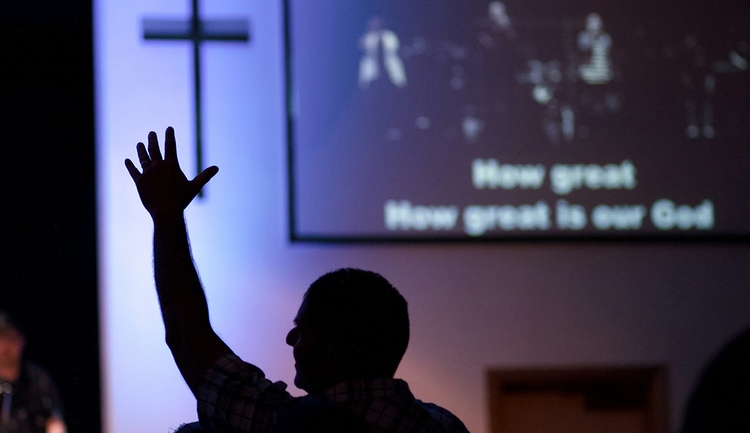Question from a reader:
Is it wrong to let others know how much we give financially to the Lord’s work? Couldn’t this encourage others to give more generously?
Answer from Randy Alcorn:
In Matthew 5 Jesus centered on actions, now in Matthew 6 he goes directly to motives—something the religious elite failed to examine. He starts with the broad category of “acts of righteousness,” then moves to three such acts—giving, prayer and fasting. These are not exhaustive. (In teaching, the rabbis often spoke in groups of threes, chosen from among many possibilities—Jesus goes on to do so with the three couplets of two treasuries, two perspectives and two masters.) He could have added Bible reading or feeding the poor, for instance. Today, we might add mission trips or attending/having a degree from a particular college or church. Any “act of righteousness” (or badge of righteousness) that can give you spiritual status.
The most important verse, the one that sets up the entire passage is the first: “Be careful not to do your acts of righteousness before men, to be seen by them.” The operative phrase is “to be seen by them.” This is not a prohibition disallowing others to see or become aware of your giving, prayers, fasting, Bible study, feeding the poor, missions work, attendance at a particular church or college. It is a commandment not to do these things in order to receive the recognition of men. (e.g., it would not have been right for Chuck Colson to do his work in order to get the Templeton prize, but it was not wrong for him to get it.) In contrast Jesus says in the last half of verse one “If you do [that is, if you do good things to win the approval of men], then you will have no reward from your Father in heaven.” The problem isn’t doing good things with reward in mind—it’s looking for the reward from men not God.
So, in verse 2 he says “when you give to the needy, do not announce it with trumpets, as the hypocrites do in the synagogues and on the streets, to be honored by men.” Trumpet blowing may seem a silly and obvious thing to do, and in fact there’s no record this was actually done—it seems to be satirical or humorous, a reference to more subtle things we do to get attention. But Christ’s focus is the reason for which they are drawing attention to what they’ve done: “to be honored by men.” This reminds us that our Lord’s core argument is not that our giving should never be seen, but only that we should never divulge or flaunt it in order to get human recognition.
He reminds them in 2b, “I tell you the truth, they have received their reward in full.” In other words, if we give in order to get praise from men, we’ll get what we seek—college wings named after us, wined (or diet-coked) and dined by parachurch ministries, name inscribed on a pew or a brick, maybe getting added to a board or seeing our names on a plaque and in the newspaper. But in getting what we seek we will lose what we should have sought, the only thing that ultimately matters and survives—the approval and reward of God.
Now we get to this verse: “But when you give to the needy, do not let your left hand know what your right hand is doing, so that your giving may be in secret.”
This is a figure of speech. It’s hyperbole, deliberate overstatement (which is in no sense misleading, since hearers know what it is). That it cannot have a literal meaning is self-evident in that a hand has no ability to know anything, and the person has only one center of knowing, the brain, which knows what both the right and left hand are doing. There is no center of intelligence in one hand or the other, nor is there an ability for the brain to withhold giving information from one hand while disclosing it to the other. Apart from extreme carelessness or senility, neither does a person have the ability to throw a switch so he doesn’t know he is giving, or that he has given.
So what’s the point? Do your giving quietly, unobtrusively. Don’t cough loudly just as you’re giving. Don’t slam dunk it in the offering. Drop your check in the offering or send it in the mail without drawing attention to yourself. Keep the envelope sealed. Give in a spirit of humility and simplicity, as a private act of worship. Don’t give in order to get your name on a list or a brick—unless you’re really fond of bricks, since that will be your only reward. Don’t give in a spirit of self-congratulation. Don’t dwell on your gift, fixating on it, building a shrine to yourself in your memory of giving. In other words, don’t make a big production out of it, either before men or in the privacy of your own heart.
Though it might appear to, this verse cannot mean that we should—or even that we can—be unaware of our own giving, any more than we could be unaware of our praying or fasting or Bible reading or evangelism. In fact, to try to make it mean that would remove the discerning, thoughtful prayerful elements of giving/praying/fasting/everything that can be supported from many Scriptures.
All right, then, can this verse mean it is always wrong for others to know we have given? There is a clear answer to this, even without appealing to all the Old Testament passages.
Acts 2:45 tells of Christians selling possessions and giving to the needy. Did people know who had done this? In many cases, the answer would be obvious. These people knew each other—if you no longer had your nice coat or your oxcart, people would figure out why. Acts 4:32-35 tells us about more people liquidating assets. Someone might say at this point “but it doesn’t name names.” Names that would have meant nothing to us are not recorded, but they were surely known at the time.
We don’t have to speculate, though, because some names were in fact named. Acts 4:36-37 tells us that Barnabas sold a field and brought the money to the feet of the apostles. If Barnabas was looking for the reward of men, his motive was wrong. But it is impossible that it be wrong that others were made aware of his gift—because it is the Word of God itself which tells us! Barnabas’s act of generosity was clearly commonly known among the believers, as it has been in every generation since.
Did public recognition tempt others to give for the wrong motives? Absolutely—go to the next verse, 5:1. Ananaias and Sapprhira gave for the wrong reasons, and went a step further by deceiving to make their gift look better than it was. But the possible abuse of something doesn’t nullify the legitimacy of the thing itself. In this case, that the body of Christ can benefit from seeing open models of generous giving, and that the world can benefit from seeing at very least the corporate generosity of the church, as an attractive witness to the grace of Christ. In other words, the risks of disclosing someone’s giving are sometimes (certainly not always, maybe not often, but at least sometimes) outweighed by the benefits of disclosure.
We need to stop putting giving in a class by itself in this arena. If I give a message on evangelism or biblical interpretation or parenting, I run the risk of trying to get my ego fed. But it may still be God’s will for me to share with the church what God has taught me in these areas. Paul spoke of himself as being a model—”Follow my example, as I follow the example of Christ,” 1 Cor. 11:1. I could write books for the wrong reasons, though I seek God’s face and ask that this wouldn’t be the case. I could be sending you this email with the wrong motive, to seek your approval rather than God’s. But I’m sending it anyway, partly because if we refrain from doing everything we could do with a wrong motive, we won’t do anything at all. (If your pastor only preaches when there’s no temptation to pride, he’ll never preach.)
If Matthew 6:2-4 means that other people shouldn’t know what someone gives, then Acts 4:36-37 clearly violates that Scripture. There’s no way around it. 1 Chronicles 29 tells exactly how much the leaders of Israel gave to build the temple, then it says “the people rejoiced at the willing response of their leaders, for they had given freely and wholeheartedly to the LORD” (v. 9). Philemon 7 is most likely a reference to Philemon’s generous giving, and 2 Cor. 8:2-3 is definitely a reference to the Macedonian’s generous giving. (They weren’t an individual, but they were a church, and churches can be guilty of pride too). Paul used the generosity of Achaian Christians to motivate Macedonian believers to be generous (2 Cor. 9:1-2).
Whatever Matt 6:2-4 means then, since God’s Word is not self-contradictory, the proper interpretation must allow for the disclosure of giving that we see in these other passages.
Moving on in the context of Matthew 6, it’s clear that whatever is true of giving is also true of praying and fasting, and visa versa. Jesus says in verse 6, “When you pray, go into your room, close the door, and pray to your Father, who is unseen.” He is clearly swinging the pendulum away from the self-conscious, self-serving, image-enhancing prayers for which the Pharisees were notorious. But did he mean that all prayer must be private? No. Scripture has many examples of public and corporate prayers. Every time the pastor or worship leader prays in church, every time parents pray with their children, husbands pray with wives or someone prays with the person he is leading to Christ, it refutes any notion that it’s always wrong to be seen or heard by others when you pray. As Matt. 6:6 doesn’t prove it’s wrong to let others hear you pray, Matt. 6:3-4 doesn’t prove it’s wrong to let others be aware of your giving. Since Jesus groups giving, prayer and fasting as the three acts of righteousness in this passage, whatever is true of one (e.g. when it’s proper to do it publicly) must be true of the others.
In fact, when the poor widow gave, she gave publicly, to the point that Jesus could actually see the two coins. He then used her as a public illustration (Luke 21:1-4). So, it was right that she gave in public, and right that people were told the exact amount of her gift. Her motives were right, and the public disclosure did nothing to nullify her heart or her act of obedience. (Though confidentiality in giving records makes sense for the reasons of this passage, it creates another temptation—many believers today take advantage of the veil of privacy around giving by using it as a cloak for their disobedience in failing to give. With all today’s talk about accountability, what do we do in the church to hold each other accountable to generous giving? People will notice if you don’t obey Hebrews 10:25’s command to attend church, but how will they notice if you fail to give?)
So, by encouraging private prayer and giving and fasting in Matthew 6, Jesus was trying to remove when possible the wrong motivations, i.e. impressing others. Like anything else—e.g. testifying to having a strong marriage, telling stories of God’s blessing on our children, talking about our Bible study or prayer life—sharing about our giving, testifying to what God has taught us in this area, can be risky. We may become prideful. However, the body of Christ needs to let its light shine before men, and we need models for the exercise of obedience and of the gifts. We dare not let the risk of our pride keep us from faithfully disclosing God’s work in this area of our lives. (Or if we must be silent to cultivate our own humility, at least we must support others who can testify to Christ’s body in a way that isn’t prideful.)
In any case, we are in desperate need of clearer models of giving, and the exercise of the gift of giving, as well as conscious efforts to give more and more wisely (“see that you also excel in this grace of giving,” 2 Cor. 8:7).
This is why in the church we need to take the risk of openly telling stories of what God has done for us in the arena of giving. In fact, what may force me to swallow my pride more than anything is talking about giving when it runs the risk of making it look like I’m patting myself on the back. (Our motive for not talking about our giving is not always humility. Sometimes it is fear, doubt and, yes, even pride.) To vulnerably express to others where I am in my giving pilgrimage can be an act of humility. Though we must always check our spiritual pulse, it certainly does not have to be an act of pride.
So, I shouldn’t be bragging about my Bible study or prayer or evangelism or parenting or giving, but I shouldn’t be covering it up either. It’s easier for people in our churches to follow footprints than commands. If we aren’t willing to openly and humbly discuss giving, how can we expect to raise up givers? The church has plenty of examples of consumers—we need to see examples of givers. (That’s why hearing all the testimonies is appropriate.) Hebrews 10:24 tells us to “spur one another on toward love and good deeds.” We can only be spurred on to by what we’re aware of, what we can see.







